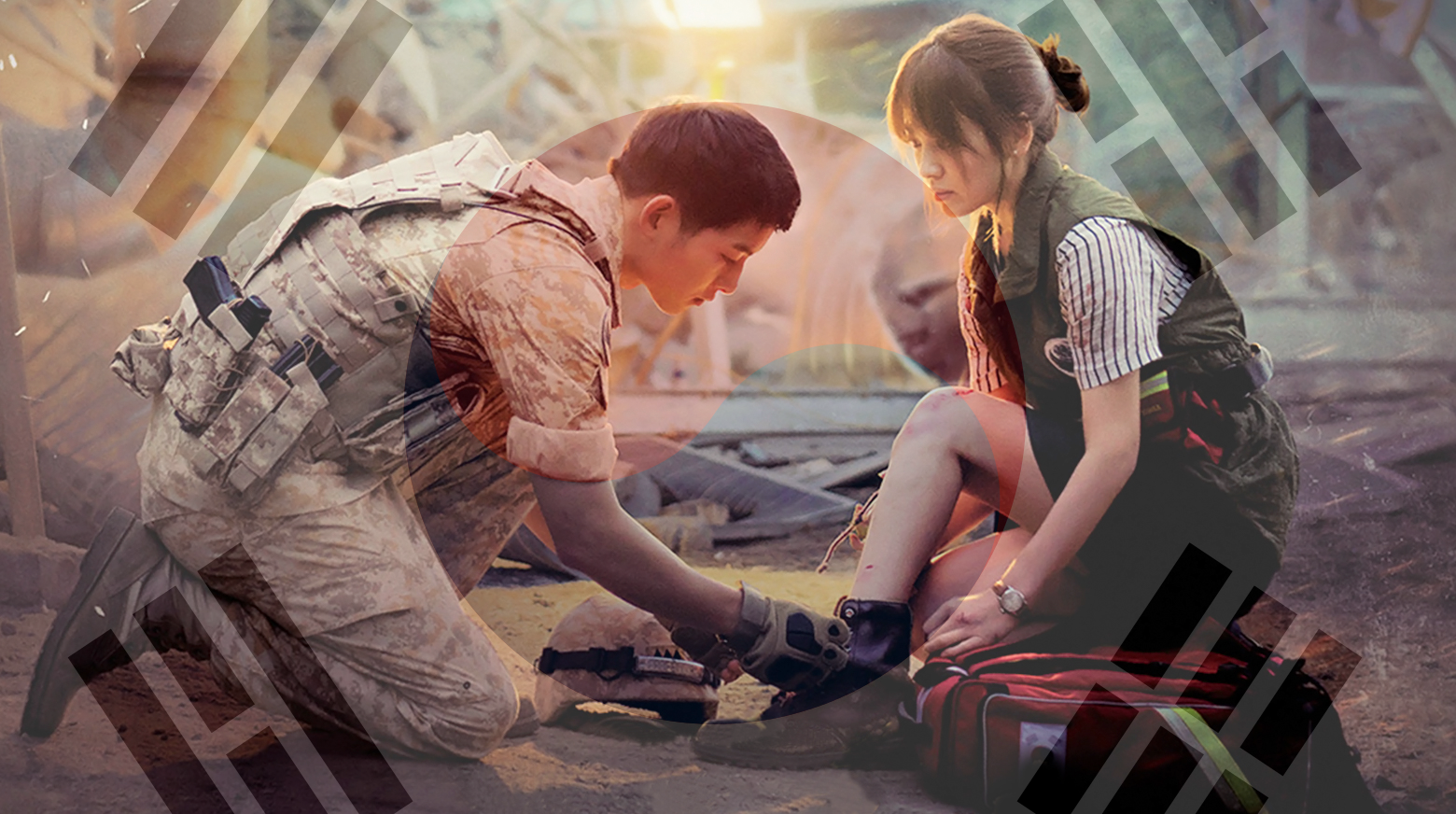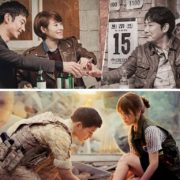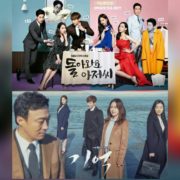Reading The Political Signs of ‘Descendants of the Sun’
Every year or so, there is an extremely trendy Korean drama that garners attention from fans and international media alike. KBS2’s currently airing blockbuster series, ”Descendants of the Sun” has been highlighted by everyone from the BBC to CNBC as audiences from around the world go crazy over the difficulties faced by Song Joong Ki’s soldier and Song Hye Kyo’s doctor. With propagandistic overtones amidst rising tensions between the Koreas, “Descendants of the Sun” hits on numerous socio-political issues affecting South Korea today.
Minor spoilers included.
Vehicle For Patriotism
Like Captain America and Superman, Captain Yoo Shi Jin is exactly what a country needs.
Anything that the “Descendants of the Sun” touches has seen a rise in popularity both in and outside of Korea, particularly South Korea’s military force. Star Song Joong Ki swooped in as the handsome, baby-faced Captain Yoo Shin Jin who has morals and can do no wrong. Song, who completed his military service in 2015, is the real life super soldier offered to South Korean viewing audiences at a time when the country has been doing some soul searching regarding its draft even as North Korea makes headlines every other day for proclaiming the end of South Korea and the United States.
The threat of North Korea hangs over South Korean society in numerous ways, but none so impactful as the mandatory conscription of all able-bodied men during the prime of their life. Over the past few years, awareness has grown over social and psychological issues afflicting many South Korean men following their service with putting their life on hold for two years. In the early 2010s there was a public discussion in South Korea to diminish the service period from around 21 months to 18 months, but safety concerns led Korean politicians to make no changes to the draft requirement: All South Korean men (barring exemption due to health issues ranging from being HIV positive to tattoos) must serve in either active duty or as civic officers. According to an interview done by CBS, South Korea’s idea of masculinity is closely linked with military service and any man who hasn’t served in active duty is considered less than manly.
Also on KultScene: DAY6 ‘Letting Go’ Music Video & Song Review
Of course, that doesn’t mean that all South Korean men serve. Sons of the elite South Korean political and business worlds reportedly serve less than their poorer counterparts, getting exemptions for a variety of reasons including revoking their Korean citizenship. A celebrity service unit was disbanded in 2013 following multiple instances of favoritism, raising cries from Korea’s vocal citizens of disparity towards the average Korean male. Multiple instances of psychological issues afflicting soldiers, including a rampage by one soldier in 2007 that led to the death of several other young conscripted soldiers, has led country’s younger generation to grow up in an environment of relative peace (until the last few years) where mandatory enlistment is perceived as less of a necessary duty for protection and more of a burden.
North Korea’s recurring threats instill fear in South Korea’s populace, but Song Joong Ki and co-star Jin Goo’s portrayal of a dashing special force officers acts as a vehicle to promote desirability for soldiers. Both characters, and most of the Korean soldiers, are portrayed as loyal, warmhearted men serving others for a greater good. They are in demand both in the show and off; both men portray soldiers involved in romances with unsuitable women (but whom they will surely end up with by the end of the series) while the actors have seen a surge in popularity throughout the world.
According to the BBC, the official paper of the Chinese Communist Party China’s People’s Daily described the show as “an excellent advertisement for conscription” that does the most to showcase South Korea’s “national spirit” and “communitarian culture.” China is reportedly in talks to recreate “Descendants of the Sun” following the show’s cosmic success and the drama’s ability to seamlessly integrate propagandistic scenes, including the heartwarming raising of the Korean flag and instances of militaristic folk songs and army chants.
Even the civilian characters, such as Song Hye Kyo’s doctor and her team, are called to the greater duties of serving others in time and are also inspired by South Korean patriotism. The show also debates consistently debates the place of soldiers in the world and places doctors, who are meant to save lives, in a place where they must understand the rules of war and killing. Above all, at the end of the day, the army is there to save its country. “As a soldier, there is nothing more important than saving the life of a Korean citizen,” says Song Joong Ki’s character in the seventh episode.
The positive image portrayed of South Korean special forces and soldiers isn’t new for K-dramas, but the “Descendants” popularity crosses borders and helps spread the idea in a way never before seen from a Korean television show.
International Relations
With China acting as the go-between between North and South Korea, the show’s popularity in China and overall positive image comes at a time when tensions are tight. Chinese audiences are falling in love with South Korean soldiers even as their army is allied with North Korean ones. “Descendants of the Sun” isn’t the first K-drama popular in China, but it may signify warming public opinion towards South Korea as North Korea is using increasingly belligerent rhetoric. The Korea Content Creative Agency (KOCCA) estimates that the show will be seen 5 billion times in China by the end of its run. Even Numerous Chinese celebrities, including ex-EXO member Luhan, have parodied moments from the show.
Also on KultScene: Female First Loves: Hyo Sung & Oh My Girl Review
While the popularity of the show in China may reflect pan-Asian political trends, the drama itself displays South Korea’s turn of the head towards the Middle East and Islamic culture as a way to move the popularity of Korean pop culture into an emerging market. South Korea has long been working with Middle Eastern countries to improve international ties, and one of the major streets in Gangnam is Tehran-ro, named after Iran’s capital. South Korea’s oil imports from the Middle East are the highest they’ve been since 1980, reports Bloomberg. K-pop and Korean dramas have been popular for several years in the Middle East and other Islamic countries, and “Descendants of the Sun” follows KCON Abu Dhabi as the second push in 2016 by Korea’s entertainment industry to focus on the Arabic speaking world.
According to the United States State Department, Arabic is spoken by nearly 300 million people. Following the success of K-dramas to fill a niche in the Chinese language market (with over 935 million speakers of Mandarin around the world,) Korean entertainment is looking to make further headway amongst Arabic-speaking audiences during a time when there is warming relations between South Korea and many Middle Eastern states.
“The Descendants of the Sun” takes place partially in the fictionalized country Urk, which is actually a Greek town but appears to be a Middle Eastern country. A branch of the Korean army is the stationed there as UN peacekeepers, highlighting South Korea’s role in worldwide affairs and mostly keeping the military action poised as internationally important work, while the medical team is there on a health mission.
The first few episodes of show features major conflict revolving around Song Hye Kyo’s character saving the life of the man reported to bring peace to the Middle East, a hint of South Korea’s importance in world events. Arabic itself is also important, as Song Joong Ki says the phrase “inshallah,” the Arabic phrase for “if God wills it,” during a pivotal scene.
While “Descendants of the Sun” comes off at first glance as just a typical K-drama, albeit one with a blockbuster cast, budget, and production value, the series is also one of the most politically aware shows coming out of Korea in some time. A deeper look at South Korea’s current climate reveals that the “Descendants of the Sun” influence is far deeper than just the surface story of lovers trying to find a happy ending amidst a warzone.
What do you think of “Descendants of the Sun” and the socio-political trends it bring to light? Share your thoughts in the comment section below and be sure to subscribe to the site and follow us on Facebook, Twitter, Instagram, and Tumblr to keep up with all of our posts.





